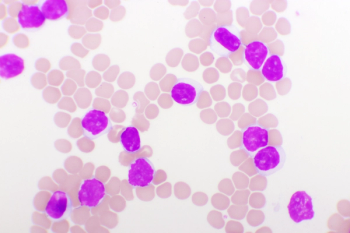
Breast cancer survivors who are minorities or medically underserved appear to experience a benefit in health-related quality of life after taking part in a community-based physical activity program.

Your AI-Trained Oncology Knowledge Connection!


Ariana Pelosci, managing editor for CancerNetwork® and the journal ONCOLOGY®, has been with the team since June 2021. She specializes in both web and print, and runs the social media accounts for CancerNetwork®.
She graduated from the University of Delaware, where she studied Media Communications and minored in journalism and marketing. At heart, she is a Jersey girl, and you can always find her down the shore during her free time.
Ariana loves to read, specifically historical or contemporary fiction. Follow Ariana on Twitter @APelosci or email her at apelosci@mjhlifesciences.com.

Breast cancer survivors who are minorities or medically underserved appear to experience a benefit in health-related quality of life after taking part in a community-based physical activity program.

The Build Back Better Act could increase drug and related expenses could eventually lead to the closure of independent oncology practices.

Patients with stage IV breast cancer who received a systemic therapy plus surgery experienced a higher survival benefit than those receiving systemic treatment alone.

A exposure-response analysis indicated that a 3.2mg/m2 dose of lurbinectedin every 3 weeks achieved a favorable risk/benefit profile in patients with small cell lung cancer.

Patients with relapsed chronic lymphocytic leukemia who were treated with either limited or continuous venetoclax and rituximab experienced improved responses during a 5-year follow-up.

Findings from a Nationally Representative study indicated that multispecialty, academically affiliated, urban cancer institutions had more access to genetic testing.

The FDA approved nab-sirolimus as the first drug specifically indicated for the treatment of patients with malignant perivascular epithelioid cell tumors.

In a systemic review assessing the use of first-line post-protocol immunotherapy for patients with kidney cell carcinoma, investigators reported that use was low in randomized clinical trials among patients in the control group.

Patients with EGFR-mutated non-squamous non–small cell lung cancer who progressed following EGFR-TKI therapy experienced a progression-free survival benefit following treatment with sintilimab plus a bevacizumab biosimilar injection and chemotherapy.

Most states in the United States had stable rates of lung cancer screenings during the COVID-19 pandemic, with some even experiencing significant improvements.

Attention needs to be paid to the psychosocial needs of patients, especially those with poor health-related quality of life, who have little support, or are single mothers.

Use of a multidisciplinary geriatric assessment-driven intervention resulted in a reduction in grade 3 or higher chemotherapy-related toxic events.

Patients with newly diagnosed glioblastoma saw improved progression-free survival when treated with tumor treating fields, pembrolizumab, and temozolomide versus historical control data.

Patients who developed brain metastases from renal cell carcinoma experienced promising intracranial activity after being treated with cabozantinib.

Patients with melanoma, head and neck squamous cell carcinoma, and cervical cancer who had not previously received immunotherapy and were treated with lifileucel plus pembrolizumab experienced promising overall response rates compared favorably with historical data on pembrolizumab monotherapy.

Patients with relapsed/refractory adult B-cell acute lymphoblastic leukemia who were treated with AUTO1 experienced durable responses.

Patients with hormone receptor–positive breast cancer in 3 separate subgroups showed an overall survival benefit when treated with eftilagimod alpha plus paclitaxel compared with the placebo.

Cell therapy omidubicel, designed for patients with hematologic malignancies who are undergoing allogeneic stem cell transplant, will be submitted to the FDA for approval in 2022.

Patients with microsatellite instability-high/mismatch repair deficient metastatic colorectal cancer treated with first-line nivolumab plus low-dose ipilimumab experienced a durable clinical benefit.

Patients who are White British and have been diagnosed with a malignant primary brain tumor were found to have a shorter survival compared with patients of other ethnicities.

The single-cell functional precision medicine treatment, an artificial intelligence strategy helps to create therapies for patients with hematologic cancers.

Germline testing for BRCA1/2 mutations in tumor tissue for treatment selection of PARP inhibition in HER2-negative metastatic breast cancer did not show large differences in outcomes compared with blood testing, inferring feasibility of tumor testing.

The utilization of 68Ga-PSMA-11 PET allowed for positive sensitivity and specificity scores for patients with intermediate to high-risk prostate cancer following radical prostatectomy and lymph node dissection.

Patients with mutant-IDH2 acute myeloid leukemia experienced a better overall response rate when treated with enasidenib plus azacitidine compared with azacitidine alone.

A comparative study indicated that patients with advanced ovarian cancer who received high and low doses of neoadjuvant chemotherapy experienced similar improvements in overall survival.

Findings from a study indicated that non-Hispanic American Indian and Alaskan Native patients with breast cancer were more likely to undergo a mastectomy compared with non-Hispanic White patients.

As lenvatinib plus pembrolizumab combination therapy results in a wide range of adverse effects, some which even led to discontinuation of the treatment, investigators suggest a proactive strategy for patients with advanced renal cell carcinoma.

Patients with cancer who have underwent radiotherapy within 6 months did not experience any notable safety concerns after receiving the Moderna mRNA-1273 vaccine.

Camrelizumab plus apatinib demonstrated efficacious anti-tumor activity and could be a worthwhile salvage therapy in high-risk chemorefractory or relapsed gestational trophoblastic neoplasia.

Patients who had a poor pathological response to preoperative chemoradiation for advanced rectal cancer and waited 8 weeks or longer for surgery were likely to experience poor overall disease-free survival after completing neoadjuvant chemoradiotherapy.